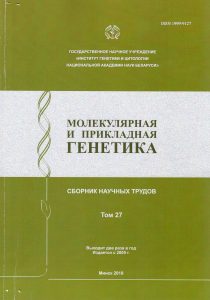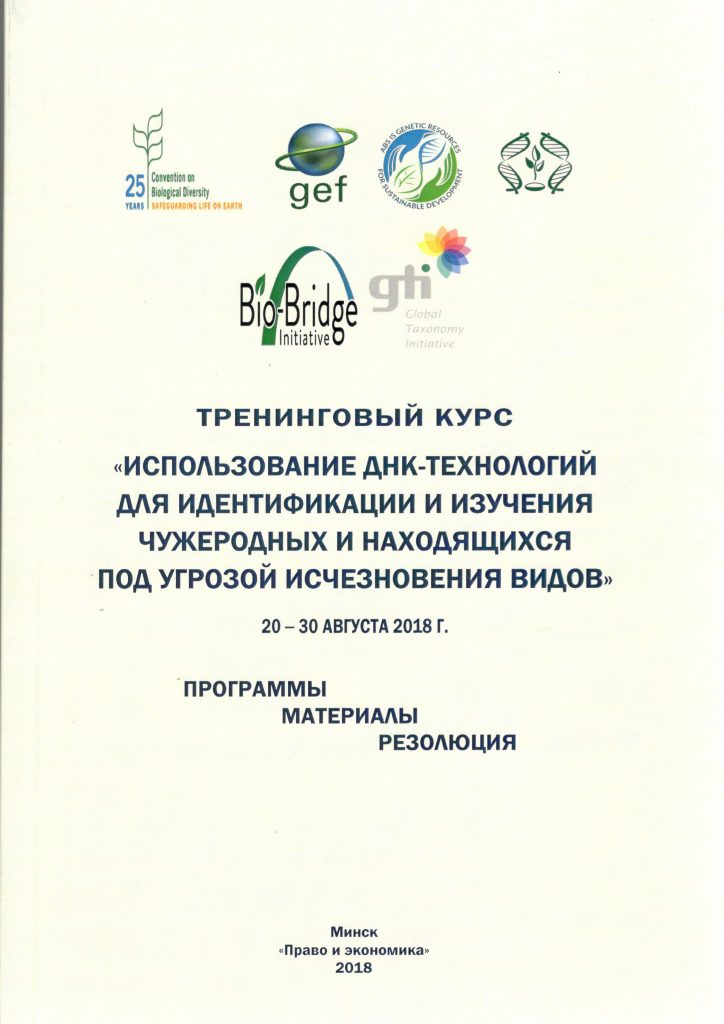BioBridge Initiative
Transfer of DNA Barcoding Technology for the Inventory and
Monitoring of Rare and Endangered Species in Belarus and other Central and Eastern European Countries
(registration with the Ministry of Economy of May 30, 2018 No. 2/18/000885)
Project duration: 30 May 2018 – 30 October 2018, Minsk

Project objective: Contribute to the overall objective of assisting Belarus and other countries of Central and Eastern Europe and Central Asia (Armenia, Kazakhstan, Lithuania, Moldova, Tajikistan, Ukraine, and etc.) in using of advanced molecular-genetic technologies, such as DNA barcoding, to identify rare and endangered species (inventory of genetic resources) and monitor biological diversity.
The project implementation has opened up the possibility for specialists from Belarus and regional countries to learn about the application of DNA barcoding technology for taxonomy, research in the field of biodiversity, inventory of genetic resources and monitoring of rare and endangered species; to create the Reference DNA Barcodes Library, which will be used by the specialists of the Region for scientific research; to establish ongoing regional collaboration between specialists working in the field of plant genetics and environmental protection, which will facilitate the use of advanced molecular-genetic technologies for the identification, inventory and monitoring of rare and endangered species.
The project implementation has contributed to the fulfillment of obligations undertaken by the Republic of Belarus under the Nagoya Protocol in terms of genetic resources’ utilization monitoring.
Project targets:
Conduct training for a group of specialists from Belarus and other countries of Central and Eastern Europe and Central Asia, including familiarization with the general program of the Global Taxonomic Initiative and methodological approaches and techniques used for collecting of organism samples for their subsequent analysis.
Develop a prototype of the Regional Reference DNA Barcodes Library as an independent structural unit of the Republican DNA Bank of a Human, Animals, Plants and Microorganisms (Belarus).
Build Regional Specialist Networking using DNA barcoding technology to exchange scientific and methodological information and conduct practical workshops on the use of DNA identification techniques in taxonomy.
Develop a project proposal on the strengthened regional collaboration of countries in the development of DNA barcoding initiative.
Assist trainees in becoming competent users and individuals contributing to the replenishment of DNA barcode databases such as BOLD (the Barcode of Life Data System) and GenBanks.
Project outcomes:
As a result of the subregional training course, 24 specialists from 7 countries of Central and Eastern Europe and Central Asia (Azerbaijan, Armenia, Belarus, Georgia, Kazakhstan, Moldova, and Ukraine) have gained practical skills in the methodology related to the collection of samples for DNA barcoding and using DNA barcoding technology in taxonomic work on the identification of rare and endangered species:
- Study of 27 plant species using the DNA barcoding technique conducted; the Republican DNA Bank replenished with animal and plant origin samples for their study and long-term storage.
- Genetic sequences obtained as a result of samples’ analysis on the Applied Biosystems (genetic analyzer) prepared for depositing with BOLD (the Barcode of Life Data System, 27 species).
A prototype of the Regional Reference DNA Barcodes Library has been designed on the basis of the Republican DNA Bank of a Human, Animals, Plants and Microorganisms, which will be used by partner countries for the inventory of genetic resources and ensured compliance with the requirements for access to genetic resources and benefit-sharing.
Regional DNA Barcoding Specialist Networking has been created to boost collaboration and information-sharing between scientific-research and other involved institutions of partner countries on theoretical and practical aspects related to the use of DNA barcoding for the study of rare and endangered plant species as a basis for the establishment of Regional “Barcode of Life” Networking.
To develop joint projects for the study of biological diversity using the DNA barcoding technique for taxonomy and to organize workshops and training courses, the Regional Coordination DNA Barcoding Board has been established, and the Resolution has been adopted as a fundamental document on the use of knowledge gained and development of plans for joint activities in the Region.






